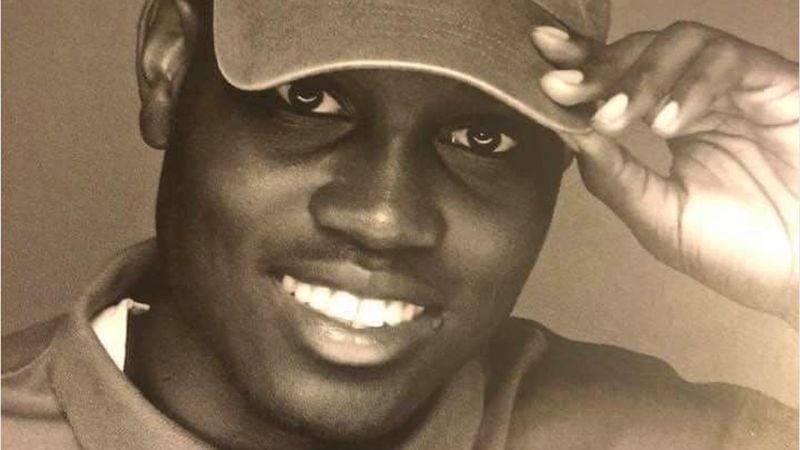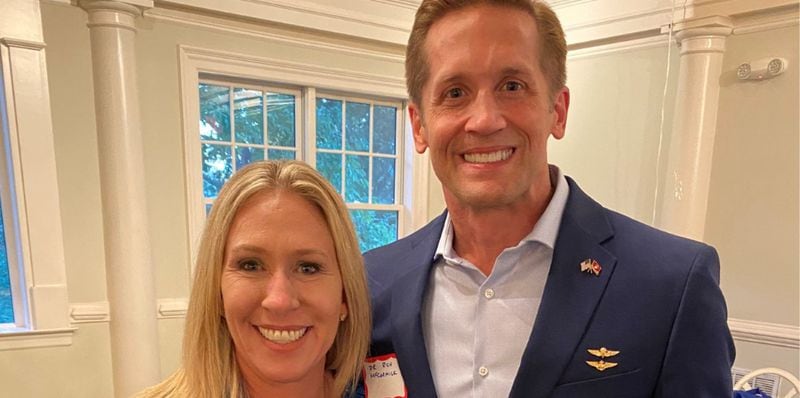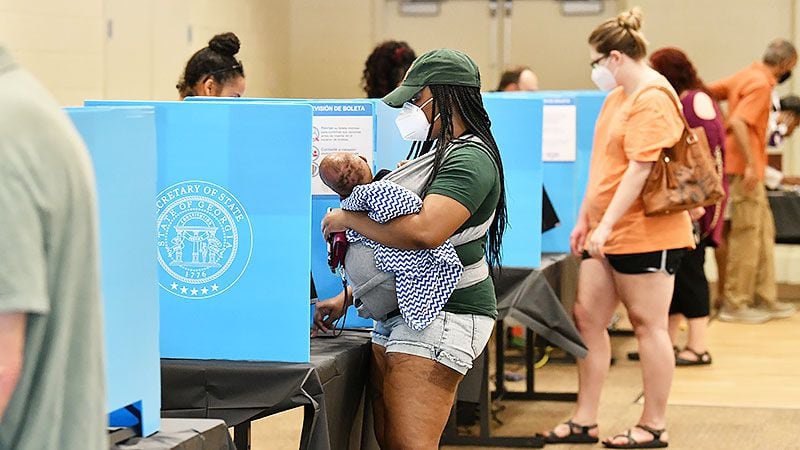Poll points to favorability problem for U.S. Senate candidate
When Gov. Brian Kemp picked Kelly Loeffler to fill a vacant U.S. Senate seat, the move was seen as an acknowledgement that Georgia Republicans had to shore up their support among women, especially women in the suburbs who had once been a bloc the GOP counted on.
Then, once Republican U.S. Rep. Doug Collins decided he would like to be a senator, things got complicated.
Loeffler has had to swing to the right while she battles Collins, Democrat Raphael Warnock and 17 other candidates in a special election to fill the final two years of retired U.S. Sen. Johnny Isakson’s term in the seat Kemp gave her.
She and Collins have both decided that survival requires them to court conservatives. The idea was to appeal to President Donald Trump’s base, although Loeffler also appears to be angling for the Attila the Hun vote.
How’s that playing with women?
A New York Times/Sienna College poll suggests that Loeffler has a gender problem. A lot of women who responded to the poll apparently don’t care for her.
Asked whether they rated Loeffler as very favorable, somewhat favorable, somewhat unfavorable or very unfavorable, 41% of those women opted for the latter two categories. (The poll’s margin of error was 4.1 percentage points.)
When the same question was posed about Collins, only 27% of those same women expressed a similar dislike of the candidate.
It may not be a huge issue at this stage of the race, which shows all the signs that it won’t be settled until a runoff in January.
The poll showed Loeffler running ahead of Collins, 23% to 17%, but they’re both at this point just aiming for the No. 2 spot in the race. That would put them in a face-to-face match in a second round against Warnock — who topped the poll at 32%.
By the way, only 19% of the poll’s female respondents rated Warnock somewhat unfavorable or very unfavorable.
It’s hard to say whether any of this figured in one of the more curious moments of a recent Senate debate, when Collins raised an issue of interior decoration in a question to Loeffler. Citing what he said appeared on a now deleted Instragram post, Collins asked Loeffler whether she still displayed what appeared to be an Andy Warhol painting or print of former Chinese Communist dictator Mao Zedong in her foyer.
It was meant to be a hit involving China — the two Republicans have been taking cues from Trump, who’s blamed the nation for the coronavirus pandemic — but Loeffler turned it into an assault on her femininity.
“You’ve attacked my hair, my makeup, how I talk, my clothes, where I’m from,” she said. “You’ve lied about me. You lie about my family. And let me tell you, here’s the truth: I’m here because I’ve earned everything I’ve got.”
Voter registrations surge in Georgia
What’s the difference between Georgia in 2016, when Donald Trump won the presidential race here by 5 percentage points, and now when the Republican is locked in a tight race with Democrat Joe Biden?
One million new voters, including 200,000 who registered in the past three months..
State registrations have now grown to 7.6 million voters, according to records The Atlanta Journal-Constitution obtained from the secretary of state’s office after the Oct. 5 registration deadline for the Nov. 3 election.
Those new voters are generally younger and more diverse. Almost half are under age 35, and nearly two-thirds of them are people of color.
That all could possibly affect the outcome of next month’s election.
“It’s getting awfully close,” said Charles Bullock, a University of Georgia political science professor. “We’ve got an increasing minority population, and that population generally votes Democratic. Republicans continue to rely almost exclusively on white voters.”
White voters now make up 53% of all registered voters in Georgia. Whites made up 57% of the electorate in 2016 and 59% in 2012.
End could be coming for citizen’s arrest
Time may be running out on Georgia’s 1863 law allowing citizen’s arrest.
Republican state Rep. Chuck Efstration, who wrote the hate-crimes legislation that became Georgia law earlier this year, has now set his sights on citizen’s arrest.
The move follows a prosecutor’s decision discouraging police from arresting three white men in the February killing of Ahmaud Arbery, a Black man they followed as he was jogging near Brunswick before he was cornered and shot. The prosecutor cited the citizen’s arrest law as justification for that guidance. The release of a video of Arbery’s death became public in May, and the GBI soon began to investigate the case. All three men are now charged with murder.
Efstration says he plans to propose legislation in the upcoming session of the General Assembly that would only allow business and home owners to detain people whom they catch in the act of a crime — and then call law enforcement.
“Having the legal authority for a person who is not trained in law enforcement to arrest that person and take that person before a judge is untenable in our current world,” said Efstration, who is in a tough reelection race in November.
Current law allows anyone who witnesses a crime or believes one has been committed to make an arrest and take that person to police.
State Rep. Bert Reeves, another Republican, says Efstration’s proposal could use some work, that it doesn’t include instances when detaining a suspect of a crime would be necessary. For example, he said he did not want changes to the law that would prevent someone who witnesses his or her car being burglarized or stolen from attempting to stop the offender from leaving.
“What we’re trying to do is eliminate vigilantism of this insane scenario that happened in Brunswick and make it so that nobody under the color of the law can make that argument ever again,” Reeves said. “But somewhere along the way we’ve got some commonsense (concern) which deals with our ability to defend our property.”
Greene endorsement could be uncomfortable for McCormick
Marjorie Taylor Greene, the GOP candidate in the 14th Congressional District known for promoting the discredited QAnon theory, has endorsed a fellow Georgia Republican running for the U.S. House, Rich McCormick.
McCormick’s campaign responded essentially by saying, “Thanks, I guess? Gee, you really shouldn’t have.”
Greene, who is running unopposed in the 14th District, is known for posting racist and offensive videos on social media — the type of thing that may not play as well in McCormick’s more diverse and suburban 7th Congressional District.
His spokesman, John Simpson, greeted news of the endorsement by stressing how much the two candidates are not alike.
“Marjorie and Rich certainly don’t agree on everything, and he has condemned some of her comments,” Simpson said. “The only thing to take from this picture is Rich and Marjorie both agree that he is the best candidate to represent GA 7 in Congress.”
Simpson pointed out that McCormick condemned Greene in August after she falsely accused billionaire philanthropist George Soros of assisting Nazis as a child. McCormick, who has criticized Soros’ support of Democratic causes, said Greene should apologize and accused her of spreading an anti-Semitic conspiracy.
To win, McCormick will probably need to appeal to the moderate and independent voters in Gwinnett County, an increasingly diverse, immigrant-heavy part of suburban Atlanta.
And he can boast of accomplishments that electorate could find pleasing: McCormick is as an emergency room physician and Marine veteran with a degree from the Morehouse School of Medicine.
But Greene’s endorsement, complete with a photo of her and McCormick in a Twitter post, immediately handed ammunition to his opponent in the 7th District, Democrat Carolyn Bourdeaux.
“As we’ve said all along, Rich McCormick’s political views are aligned with the racist and anti-Semitic conspiracy theories of the far right,” her campaign said.
Final fundraising reports will be hard to find before election
When voters head to the polls, some of them like to know who’s been bankrolling whom on the campaign trail.
This year, that type of information will be hard to get before Election Day.
Citing an obscure section of Georgia’s campaign finance law, the state ethics commission has moved the deadline to file the final pre-election fundraising reports to the eve of the election.
Since some campaigns and political action committees and other groups wait until the last minute, they could be filing at 11:59 p.m. on Nov. 2.
It’s a big blow for transparency because this year millions of dollars could pour into Georgia in the final days of the election cycle because the state not only faces a highly competitive presidential race but also tight contests for two U.S. Senate seats and critical showdowns for seats in Congress and the General Assembly.
The reports are technically due Sunday, but there’s a grace period of five working days, meaning they really don’t have to be filed until Oct. 30.
But David Emadi, the executive director of the ethics commission, noted that state law extends that grace period when the official deadline falls on a weekend. That pushed the deadline to the day before the election.
“It may not be ideal, but it’s my duty to follow the law,” Emadi said.
Rick Thompson, a member of the commission’s board, called the shift in deadlines “unfortunate.”
“The situation does not contribute to the mission of the agency and the public’s trust,” Thompson said.
Emadi said he may address the change in deadlines in the ethics package his agency is expected to propose to the 2021 General Assembly.
Credit: Hyosub Shin, hyosub.shin@ajc.com
Credit: Hyosub Shin, hyosub.shin@ajc.com
Critics of state voting system will monitor it Election Day
Advocates who hope to replace the state’s touchscreen voting machines with paper ballots now will get a front-seat view on the election process on Election Day.
Marilyn Marks and others associated with the Coalition for Governance, which has pressed for paper ballots rather than touchscreen voting through the court system, will serve as poll watchers for the Libertarian Party of Georgia. Marks has said the touchscreens are vulnerable to hacking, tampering or programming errors.
Ryan Graham, chairman of the Libertarian Party, said it found it shared interests with the coalition.
“We’ve been in contact with Marilyn Marks for some time now. We’ve been proponents for paper ballots for a while — we’re very suspicious of the voting machines, ourselves,” Graham said. “We had the means to get them in there, and so we did.”
Candidates, endorsements, etc.:
- The Alliance for Retired Americans, which counts 70,000 members in Georgia, is throwing its support behind Democratic nominee Jon Ossoff in his U.S. Senate race against Republican incumbent David Perdue. The group cites Ossoff’s plans to expand health care access as its reason for backing the challenger.
Ossoff also picked up an endorsement from former U.S. Attorney General Eric Holder.
- Michael Flynn, President Donald Trump’s first national security adviser, posted an endorsement of Republican U.S. Rep. Doug Collins over fellow Republican U.S. Sen. Kelly Loeffler in Georgia’s special election for Loeffler’s seat.
- Democratic presidential nominee Joe Biden is backing state Sen. Nikema Williams in her bid in the 5th Congressional District.











